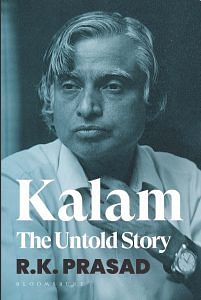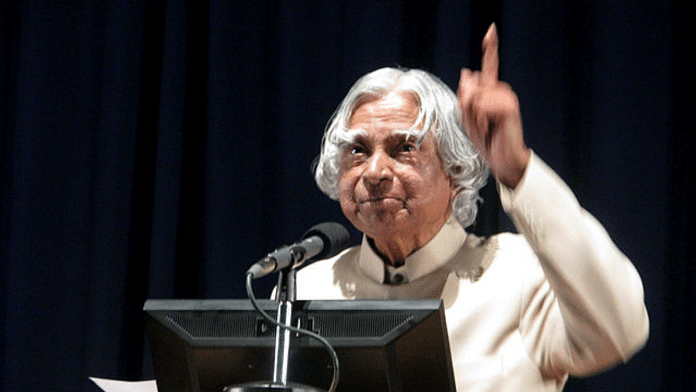As the end of his term neared, there was overwhelming public opinion in favour of his continuing in office. He got thousands of letters and emails from across the
country telling him he had to continue as President, that he was the person everyone loved and so on. He also got letters from several eminent people asking him
to continue in office. I still have one such letter from the eminent jurist Fali Nariman asking him not to refuse an offer of a second term. A lot of the correspondence of that time relating to this is in the possession of his family. The media too seemed to be of the opinion that he should continue.
There was a strong rumour that some politicians too wanted him to continue. He had become President during the reign of the BJP-led NDA, and now it was the Congress-led UPA ruling at the Centre. Some among the Congress wanted him to continue, but not
so their supreme leader. There were those who did not want him to continue, as they felt that he was holding up some senior Congress leader’s chance at the post.
But soon there were clear feelers being sent out to him to test his readiness for a second term. Gradually, the media got a whiff of this and, of course, started digging around for opinions and comments to find out if he was indeed under consideration. The leader of one of the left parties supporting the UPA from outside made things very clear when he told the media that the presidential candidate would not be decided by emails and messages – a dig at the correspondence Kalam was receiving exhorting him to continue, news of which seemed to have got around to the media. Since Kalam’s association with the Pokhran-II blasts, the left had not been in his favour. The other thing that irked them was a random comment Kalam made in one of his speeches as President that India should have a two-party system, and that smaller parties should merge into one party or the other.
Also read: How this simple, God-loving Indian Muslim left behind such an enduring legacy
Of course, there were individual politicians from the left who liked him. Like Binoy Vishwam of the Communist Party of India (CPI), who rushed from Idukki to Kochi during one of Kalam’s visits to Kerala, and was content to just hold his hand and exchange greetings with him. But politically he had to follow his party’s views. The CPI’s general secretary A.B. Bardhan, a severe critic of Kalam’s, did not share Vishwam’s reverence for the President; they made a strong pitch for Pratibha Patil.
‘We will show Kalam how a President ought to behave’ was the message their comments and actions conveyed. They were completely against Kalam’s proactive role as President. So, suddenly, Mrs Patil was announced as the UPA’s presidential candidate. Kalam read about these developments and comments in the newspapers, but would simply smile and say nothing. Close to demitting office, he became yogi-like. He had always been that way, but I felt he became even more so as time passed.
You could criticize him, blame him, say anything, but no response at all would be forthcoming from him. There were at least two instances, according to me, when Kalam could have managed a second term as President had he been ready for some quid pro quo politics. A couple of months before he was to demit office, the Dravida Munnetra Kazhagam (DMK) patriarch called on him. He had a good number of MPs at that time and told Kalam he could tilt the decision in his favour.
However, nothing came of their discussion. He was soon followed by the supreme leader of the All India Anna Dravida Munnetra Kazhagam (AIADMK). Her party was in opposition in Tamil Nadu at that time, and she pleaded with Kalam to contest for a second term as a candidate of the Third Front. That would have created a big problem for the largest party at the Centre, and they were already nervous about this possibility as there were many disgruntled insiders who may have voted for Kalam and not the Congress’s candidate. And the AIADMK leader seemed determined to work against the Congress, which was then aligned with her arch-rival. I was told that she made a very strong pitch while trying to persuade Kalam to contest.
Also read: What’s common between APJ Abdul Kalam and Narendra Modi
She promised to gather all the opposition parties to vote for him. But Kalam was firm – if there was no consensus, he would not contest, he said. So, she too, like her rival, left his office dejected by his decision not to contest. Until May (Kalam’s tenure was to end in July
2007), there was a rumour floating about that Kalam’s candidature was not ruled out. Then came the sudden announcement by the UPA of their choice of Pratibha Patil. Perhaps they did not want a President with a public face and public support; they did not like it
that a President had become so popular.
However, even though the UPA and the left supported Patil, if Kalam had tried hard he may have fetched comparable support, but then he wanted to be liked by all. I strongly felt that
he would have liked to continue but did not want to risk a defeat. That was one weakness of his, perhaps – that he wanted constant assurance that he was liked and respected by all. He was afraid of criticism of any kind and tried his best to avoid controversy. He also feared
that people might call him power-hungry, someone who wanted to stick on to his seat. In 2002 he had had the support of 80 per cent of the political leaders. Now, in 2007, he was not too sure and did not want to jump into the fray if he was not assured one hundred per
cent success.
 This excerpt from ‘Kalam: The Untold Story’ by R.K. Prasad has been published with permission from Bloomsbury.
This excerpt from ‘Kalam: The Untold Story’ by R.K. Prasad has been published with permission from Bloomsbury.



